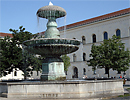Religion in the Anthropocene: Challenges, Idolatries, Transformations
5th International Conference of the European Forum for the Study of Religion and Environment
14.05.2015 – 17.05.2015
Location: LMU Main Building, Geschwister-Scholl-Platz 1, 80539 Munich
Conveners: Markus Vogt (LMU Munich), Celia Deane-Drummond (University of Notre Dame), Sigurd Bergmann (Norwegian University of Science and Technology), Claudia R. Binder (LMU Munich), and Dieter Gerten (Potsdam Institute for Climate Impact Research)
Program (PDF, 21 KB)
The Rachel Carson Center for Environment and Society is collaborating with the European Forum for the Study of Religion and the Environment (EFSRE) to bring you a conference on “Religion in the Anthropocene.”
The notion of the “Anthropocene” characterizes the current era as a new geological epoch in which the imprint of collective human activities is so pervasive that major properties of planet Earth are at risk of destabilization. Related concepts suggest that humanity is now close to passing several “planetary boundaries” and “tipping points.” These notions have stirred up discussions primarily in the earth sciences, where research now focuses on a more proper understanding of humanity’s interaction with the biophysical earth system. However, the notion of the Anthropocene poses a tremendous challenge for the humanities as well, as it ultimately means that human activities decide on the future evolution of Earth, and that the human-nature relationship is in need of transformation so as to ensure sustainable future development. In this context the possible role of geoengineering is very controversial in the dialog between technology, politics, and religions.
This fifth EFSRE conference is a forum (with plenary keynotes and special sessions) for an interdisciplinary dialogue on the Anthropocene. Discussions will center around the many possible roles of religion and beliefs in this human-dominated era and its foreseeable future. Scholarly contributions are invited on the manifold challenges that the Anthropocene poses to religions, and on how religion could act as a “planetary opportunity” and driving force to stay within planetary boundaries.
The conference includes a guided tour through the programmatic exhibition “Welcome to the Anthropocene: The Earth in Our Hands” in the Deutsches Museum in connection with the public panel discussion about “Geoengineering: Hope or Hubris?”
We invite contributions from scholars based anywhere in the world and in all fields that address the theme of the conference. Deadline for submissions is 15 February 2015. A decision will be made by 1 March 2015. Please submit your abstract of no more than 200 words, together with a brief (one-page) CV as an e-mail attachment to soz.ethik@kaththeol.uni-muenchen.de.
Registration for the event will be open from 15 January to 31 March 2015. An invoice for the conference fee (230€) will be sent after registration. Contact: soz.ethik@kaththeol.uni-muenchen.de.
Participants are responsible to organize their own hotel. We recommend Hotel Hauser, which is very close to the university. Another hotel with a good comfort but not too expensive is Motel One.
For further information, please contact:
Simone Birnstock,
Chair of Social Ethics at the University of Munich,
Email: soz.ethik@kaththeol.uni-muenchen.de
Speakers:
- Bishop Heinrich Bedford-Strohm, Munich
- Sigurd Bergmann (Norwegian University of Science and Technology)
- Claudia R. Binder (LMU Munich)
- Nikolaus Brantschen (Lassalle Institute, Bad Schönbrunn)
- Celia Deane-Drummond (University of Notre Dame)
- Hans Diefenbacher (Heidelberg University)
- Agustin Fuentes (University of Notre Dame)
- Dieter Gerten (Potsdam Institute for Climate Impact Research)
- Andreas Gösele (Munich University of Philosophy)
- Mark Lawrence (Institute for Advanced Sustainability Studies)
- Franz Mauelshagen (Institute for the Advanced Studies in the Humanities, Essen)
- Michael Northcott (Edinburgh University)
- Michael Reder (Munich University of Philosophy)
- Stefan Skrimshire (University of Leeds)
- Bron Szerszynski (Lancaster University)
- Markus Vogt (LMU Munich)


